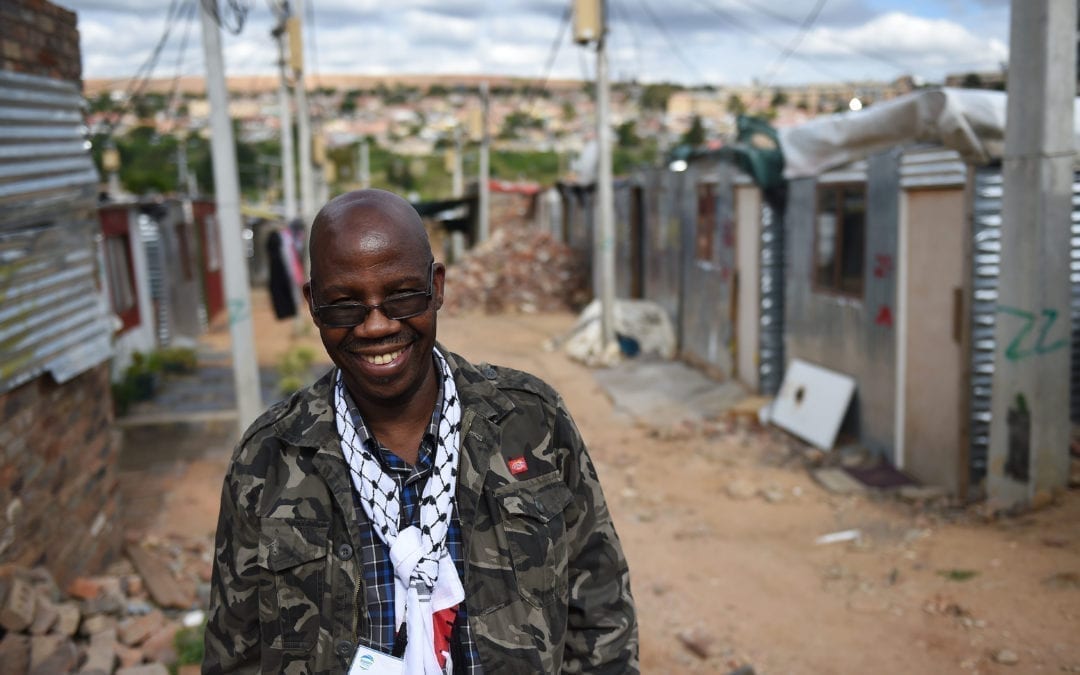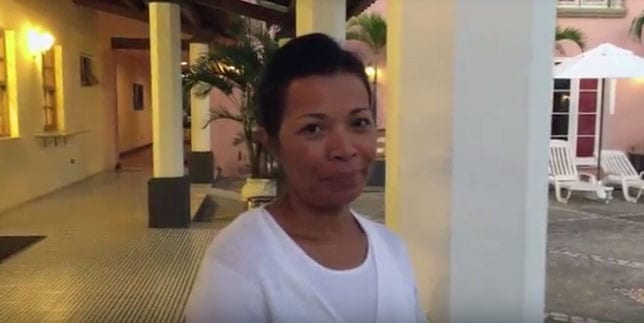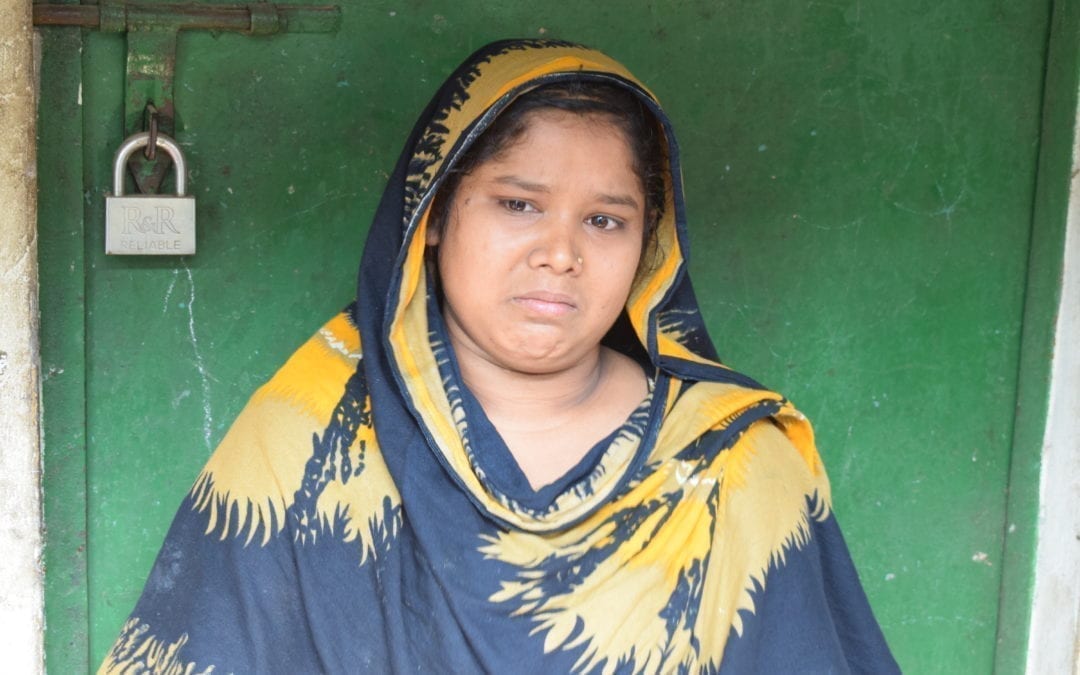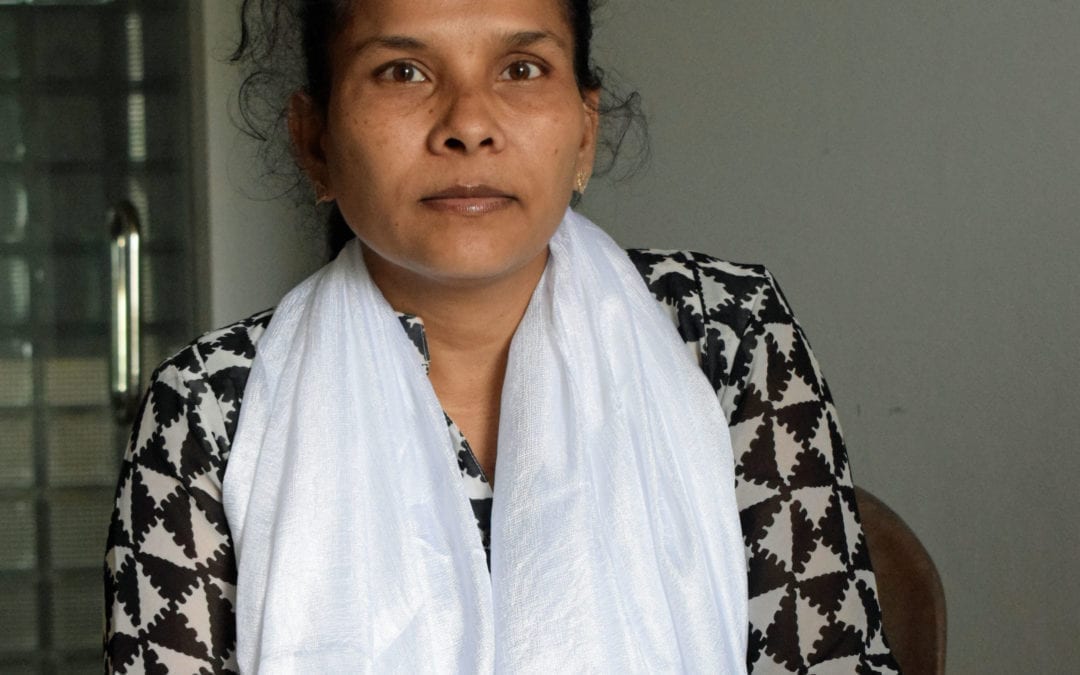
South Africa Miners Formed Union ‘to Fight Exploitation’
When Joe Montisetse came to South Africa from Botswana to work in gold mines in the early 1980s, he saw a black pool of water deep in a mine that signified deadly methane. Yet after he brought up the issue to supervisors, they insisted he continue working, but Montisetse refused.
Two co-workers were killed a few hours later when the methane exploded.
Today, Montisete is newly elected president of the National Union of Mineworkers, a position he achieved after helping form a local union at the gold mine soon after his co-workers’ deaths. After they formed the union, workers were safer, he says.
“We formed union as mine workers to defend against oppression and exploitation.”

‘Domestic Workers Work from Morning to Evening with No Break’
I am Marie Constant, I am from Madagascar. I have worked as a domestic worker in Lebanon since 1997. I work for one person only. The work is difficult, especially when we receive guests as we don’t have choice but stay up late working until the guests leave which is usually around midnight or sometimes around 1 a.m.
In general, the domestic workers don’t have a choice as they need to work from morning until evening with no specific break time and no holidays. And because of these rights abuse, we decided to form a union to defend our rights. Also, the fact that most domestic workers don’t have the right to weekly leave, we try to reach out to all the domestic workers women in most of the regions to educate them about their rights.

‘Everyone around Us Was Dead’
I am Ziasmin Sultana. I came to Dhaka at a very young age with my family and got married two years later in 2007. I was happy with my family even though our earnings were not much. It was in 2011 that I joined a factory in Rana Plaza hoping to provide for our growing family. I worked there for two years before the collapse.
There were about 1,000 workers on the second floor where I worked. There were no ceiling fans. The only ventilation we had was from the windows which was not enough, making it a very hot environment. I had to work overtime frequently as the basic salary was not much; going there at 8 a.m. and coming back at midnight. Moreover, we were frequently humiliated both verbally and physically. If the operators were caught talking to each other, they were made to stand on a stool at the front of the line holding their ears. This was our life.
This all changed on April 24, 2013. The previous day, we had seen cracks [in the building] form right in front of our eyes. We did not want to enter the building the next day but they announced that it was safe to enter, they had it checked with an engineer. So we reluctantly went in. At about 8:45 a.m., the electricity went out and the generator was turned on. Instantly, the building was shaking violently and we ran for our lives, fearing that danger was imminent.
Entering the stairway was nearly impossible as it became overcrowded. Just then, there was black smoke and suddenly, I found myself falling. Everything happened in an instant and it was dark everywhere. When I came to my senses, I realized that three of us have survived and everyone else around us was dead. I thought this is where my grave would be, as there was no way to escape.
After many hours, we could see a glimpse of light and we crawled towards it over the lifeless bodies of our colleagues. The rescuers found us and they came down with ropes. I did not have the strength to hold on to it, but I realized that this was not the end of me after all. They took me to a hospital to be treated and I was physically well after a few days.
Even after five years, I can still hear the cries of my colleagues who were crushed under the concrete. Sometimes I cannot sleep—I am gripped with fear that the ceiling is falling over me and I run to another room in the middle of the night. It is difficult for me to work, as I frequently become ill and tired.
Still, our lives move on. It is true that the salary has increased but the managers’ behavior has not improved. We have to keep working with our mouths sealed. But after what I have been through, I realize how lucky I have been and I hope that things will improve for my children in the future.
As told to Istiak, an intern in the Solidarity Center Bangladesh office.

Bangladesh Garment Worker: ‘There Is Lots More Work to be Done’
I am Khadiza Akhter, vice president of the Sommilito Garments Sramik Federation (SGSF), where I have worked since 2008.
I started to work in a garment factory at a very young age. My family was poor, so I did not have the luxury to continue my education. One day I came to know about a federation (BIGUF) which was led by women. As women leaders were rare I went to attend one of the sessions of that federation. There, for the first time, I heard about labor law.
Factories did not follow Bangladeshi labor law. When I tried to raise voice against malpractices, my supervisors threatened my job. Our factory did not have an active union so I could not take any legal action against such abuse, but I received training in labor law from my federation. Eventually I was blacklisted in the garment sector for my union work, but BIGUF offered me a job and I worked there for six years as an organizer.
In 2008, I joined Sommilito Garments Sramik Federation (SGSF). And I did try to unite workers to form an active union for a factory in Dhaka, but the government rejected the registration of the union.
The Rana Plaza disaster changed perspectives. The entire working community realized that same kind of disaster could have happened to them, so they became more focused on a safe working environment. Many workers came to Ashulia to protest.
SGSF started to work with union members to identify unsafe buildings. Our trained organizers conducted fire and safety training for educating general members. They were interested to come to our training so that they could understand legal requirements for ensuring the safety of the factories.
The Accord on Fire and Building Safety in Bangladesh (the Accord) and the Alliance for Bangladesh Worker Safety (the Alliance) contributed to ensuring the safety of the factories but there is lots more work to be done. For instance, no routine or monthly check up is done in most factories. Additionally, fire extinguishers and other equipment are not maintained by the management. Here, almost all the safety committee exists only on paper. We are now working in this arena for maintaining the standard of fire safety. This is a big task in the future.
‘Workers Must Be Aware of Their Rights and United to Achieve Them’
My name is Shamima Aktar and I am a responsible member of my society working as an organizer at Bangladesh Garment and Industrial Workers’ Federation (BGIWF). This was not the case 10 years back. My father was diagnosed with cancer and our family of seven had difficulty making ends meet. Thus, I had to begin working when I was in eighth grade in a small organization that help street children in my community.
From then on, I never looked back, I worked in a garments factory and still managed to acquire a GPA 5 in SSC examination, and this made my father proud. But I did not forget about the hardship that my colleagues and I went through in the garments factory. We were deprived of our basic rights and even more, we did not even know what our rights were. There were chronic shortage of drinking water, bathroom facilities and space for moving around. I always wished I could do something to improve the conditions, do something so that we could receive the minimal facilities.
Then in 2014, I joined BGIWF. I got the opportunity to struggle toward those goals of mine. Things were already on the move due to the Rana Plaza tragedy just a year back. Infrastructure was improving, emergency exit and fire safety was put in place and many factories were relocated from residential buildings to Ashulia, Savar and Narayanganj.
I believed that the workers must be aware of their rights and they must be united to achieve them. That is what we do at BGIWF—we train them to let them know what they deserve and we empower them so that they can claim their rights from the factory owners.
This work has put me in difficult situations and I would like to share one such event. In one factory where we helped to organize a trade union, the factory management called a meeting with us and the union to talk about a demand made by the worker’s union that the salaries must be paid [in a timely fashion]. The factory management would not grant it, and at one point we were locked and beaten. But what moved me was that hearing about our abuse, 17 trade unions around the community immediately came to our aid and barricaded the factory we were in.
Thus, I gathered my courage that the work we were doing was meaningful to many. The workers needed us on their side to be able to live in peace and I wish to [continue organizing workers] no matter how difficult it is for me.
